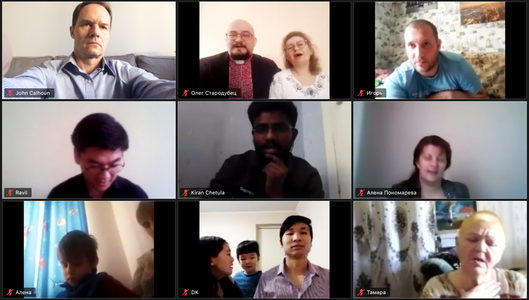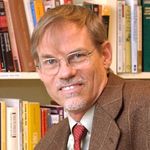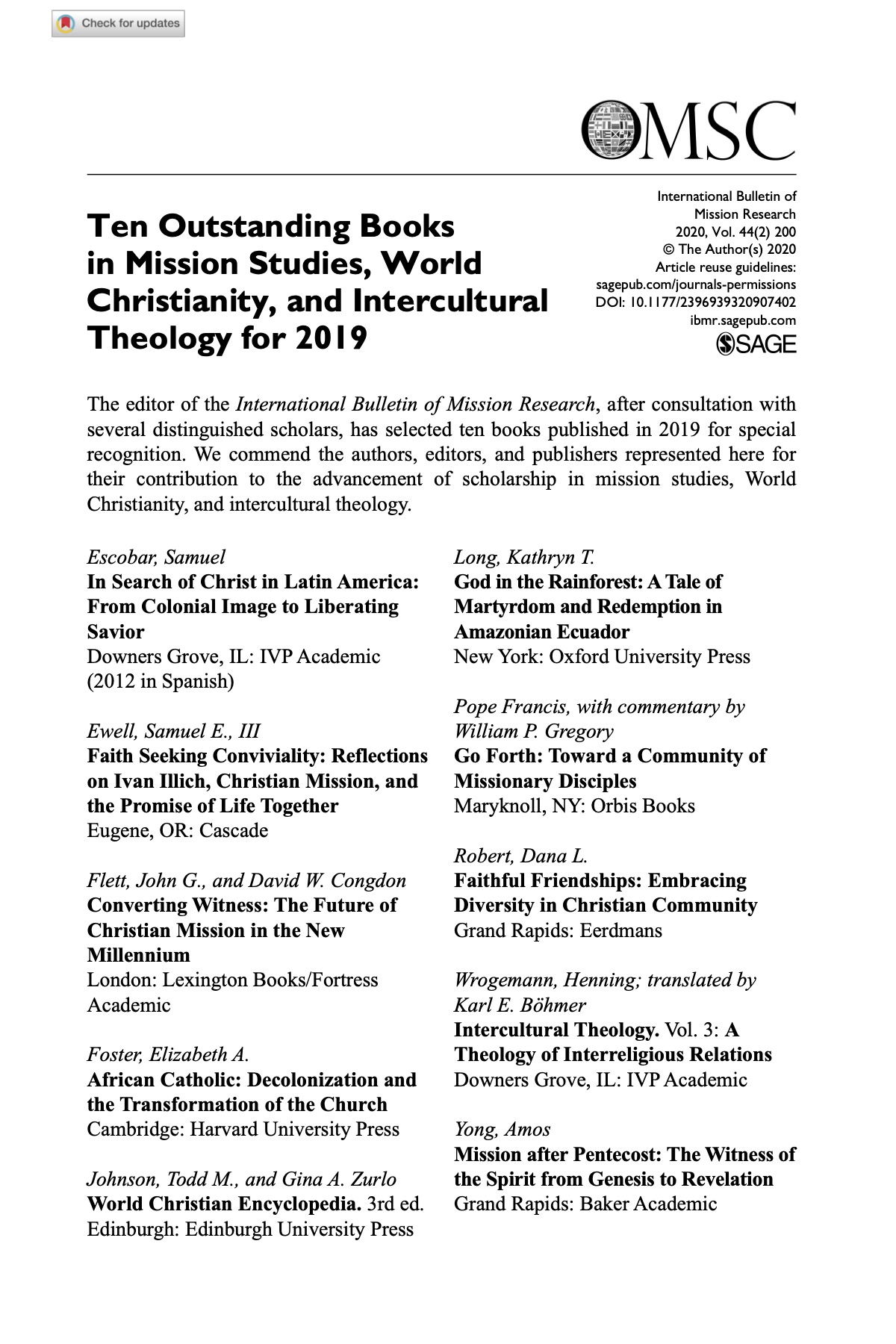News of the extended network of faculty, alumni, students, visiting researchers, and mission partners is regularly updated, and some of the big ideas or major events in Global Christianity are covered in the CGCM News.
Call for Papers Reminder: Special Issue of the Journal RELIGIONS
This Call for Papers is on behalf of the journal RELIGIONS, which is preparing a special issue entitled “Broadening Themes and Methodologies in the Research and Writing of History and Christian Mission Theologies.” We are looking for proposals that will address the following description:This special issue seeks to explore the intersection between history, mission, and theology in the worldwide Christian movement. Essays are invited that identify and investigate new themes or methodologies in the research and writing of the history of Christianity and Christian mission theology. While recent scholarship has begun to diffuse the separation between the history of Christianity and the history of Christian mission, this special issue directly challenges the division between the history of Christianity, the history of Christian mission, and the history of theology. Rather than separate, the issue's focus argues that they are in constant conversation. Thus, the issue's central question might be framed as: How have Christian mission activity and theological constructs shaped, reordered, deconstructed, etc., each other in particular periods and contexts?For more information, you can follow the link, https://www.mdpi.com/journal/religions/special_ issues/Mission#editors If you are interested in submitting a paper, please send (1) a tentative title and (2) an abstract of no more than 500 words by June 15, 2020. Please send it to the following email address, carlos_cardoza@baylor.edu The second way is to submit an essay following the directions in the link provided above. Take note that given the current circumstances, RELIGION has extended the submission of manuscripts for 30 January 2021.
Call for Papers: British Protestant Missionaries to Formosa
Sharing Spaces: British Protestant Missionaries to Formosa
In honor of missionary contributions to Taiwan, Changhua Christian Hospital Historical Museum collaborates with Asia Pacific Studies, University of Central Lancashire (UCLAN), Department of History, Tung Hai University, Department of History, National Chung Shing University, and Presbyterian Church in Taiwan (PCT) to host the 2020 International Conference on the History of Christian Protestant Missionaries. The conference is due to take place on the 24th – 25th September 2020, in the Changhua Christian Hospital International Education and Training Center (Changhua, Taiwan).
Subthemes include:
- Translating God: Missionary Linguistics
- Social Development and Missionary Values
- Medical Mission History and the Practice of Social Care
- Missionary Historiography in Taiwan
- Missionary Recordings of Environment Sustainability and Climate Change
- The History and Influence of Women Missionaries
- The Global and the Local: The Transnationalism of missionary movements
- Practice of historical Archive research
In addition to the topics mentioned above, other contributions related to the study of Taiwanese Christian culture, or the study of missionary history not limited to Taiwan, inter-denominational missionary issues of evangelicals, and contemporary challenges of Christian culture and history are all welcome.
Deadline for submissions is the 30 June 2020. For further details, please see the official Call for Papers or email the Conference Organiser.
Ukraine: Ministry Amid Extraordinary Circumstances

Congregations the world over are trying to navigate worship and ministry amidst the covid-19 pandemic. In Ukraine, the church is also seeking to be faithful in the middle of the war. Since Russia invaded Ukraine in 2014, 13,000 soldiers and civilians have died and 1.5 million people have been displaced. John Calhoun, a Global Ministries missionary of the United Methodist Church, describes how Christians in Kyiv are navigating their local and global challenges.
John Parker Awarded Franciscan History Fellowship
 John Parker was recently awarded a dissertation fellowship by the Academy of American Franciscan History. Mr. Parker's dissertation is tentatively entitled, "Libertas est Bonum Ordinis Superioris Omnium Bonorum: Perfect Obedientia in Epifanio Moirans O.F.M. cap's Iusta Defensio." He also has a chapter in the forthcoming, The Dominicans as Participants, Witnesses, and Critics of the Colonization of Early Latin America (Routledge).
John Parker was recently awarded a dissertation fellowship by the Academy of American Franciscan History. Mr. Parker's dissertation is tentatively entitled, "Libertas est Bonum Ordinis Superioris Omnium Bonorum: Perfect Obedientia in Epifanio Moirans O.F.M. cap's Iusta Defensio." He also has a chapter in the forthcoming, The Dominicans as Participants, Witnesses, and Critics of the Colonization of Early Latin America (Routledge).
Online Communion?
The United Methodist Church, like so many others, is searching for a way to be faithful to the marks of the Church: the preaching of the Word and the administration of the sacraments. But how can that be done during social distancing? "Both Green Light, Red Light for Online Communion," explores how different people are responding. Note that several of those featured are connected to Boston University (Karen Westerfield Tucker, Ryan Danker, Bishop Oxnam, and Mark Stram).
Missional Responses to COVID-19
| Tuesday April 28 | 12:00 to 1:30pm
LAST CHANCE TO RSVP! The coronavirus has presented a unique missional opportunity to be the loving embrace of God to our neighbors. UniteBoston has been reaching out to Christian leaders in Boston to see how they are doing and to listen for the “good news stories” that are emerging. In this webinar, we will feature the stories of four church leaders who will be sharing how their church is caring for the body of Christ and missionally engaging, despite tight restrictions. Join us to hear real stories from church pastors and leaders from the front, followed by Q & A. |
American Academy of Arts & Sciences Elects Two More CGCM Faculty
The American Academy of Arts and Sciences has elected seven historians to become members in 2020. Two of them, Linda Heywood and John Thornton, are faculty associates at the Center for Global Christianity and Mission. They join Dana Robert, as the second and third professors in the CGCM given this high honor.
Call for Contributors: World Christianity and COVID-19
WORLD CHRISTIANITY AND COVID-19: THEOLOGICAL REFLECTIONS ON SUFFERING
Editors: Chammah J. Kaunda, Atola Longkumer, Kenneth R. Ross Jooseup Keum, and Roderick Hewitt
The United Nations (U.N) Secretary-General Antonio Guterres lamented, "We are facing a global health crisis unlike any in the 75-year history of the United Nations — one that is killing people, spreading human suffering and upending people's lives. But this is much more than a health crisis. It is a human crisis. The coronavirus disease (COVID-19) is attacking societies at their core." It was in March 2020 when the World Health Organization (WHO) declared the coronavirus (COVID-19) outbreak as a global pandemic. COVID-19 first appeared in Wuhan in China in December 2019. The rates of infections have quickly accelerated in almost every corner of the world with over a million people already infected and nearly a hundred thousand people have lost their lives. This has prompted extraordinary forms of social and national distancing as one nation after another has gone into lockdown. Thewidespread travel restrictions and business closures are now threatening job securities and a global economic recession.
In just over 3 months, COVID-19 has altered the human social world. It is a contagious but also a social disease, a human social crisis. The COVID-19 has spread everywhere regardless of culture, class, religion, gender, sexuality, race or region. It is threatening relational rituals such as hugs, handshakes, kisses, and cultural ways of venerating the dead and bereavement consolations have been discarded to reduce the spread of the virus. COVID-19 is touching at the core of the problem of suffering, beyond epidemiological question, in various fields of spiritual, relational, cultural, funeral, families, economic, political, psychological, mental, and ethical which extend far beyond medical interests. There are stories of ups and downs of the struggle with faith and courage, hope and despair over all the world.
Many are re-asking the ancient question: ‘where is God in COVID-19?’ This question has been asked, perhaps, from antiquity. It touches at the core of the “problem of suffering,” and various “theodicies”. Traditionally, theologians and philosophers have largely engaged this problem in the form of theodicies, or justifications of God in the context of suffering. This is a question, however, which human beings have grappled with from time immemorial. The question now troubles the minds of millions of both believers and non-believers alike, who are dreading an ever-rising death toll, troubled by stories of an overwhelmed teams of physicians forced to triage patients, are restricted from visiting their sick in hospitals and cannot attend the funerals of their loved ones. Relationships have been quarantined. As one granddaughter lamented, “There are no funerals ... They buried him like that, without a funeral, without his loved ones, with just a blessing from the priest.”
Beyond the question of suffering, some populist preachers are proclaiming that coronavirus pandemic is a judgment from God for ubiquitous evil in the world. In a recent survey in the United States, it was discovered that more than four in 10 likely voters believe COVID-19 “is a wake-up call from God or a sign of coming judgment.”
This raises a pertinent question: what kind of God are we experiencing in the context of COVID-19 pandemic? Is it an impassable God who does not suffer? Or a passible God who is suffering with the world? Scholars have argued that God “suffers and we all need a God who suffers, because God’s willingness to suffer with and for creation enables us to make our own suffering meaningful. In identifying with Christ in his suffering, human suffering can be made meaningful and appropriated into one’s being; this meaning-making also provides the impetus to stand in solidarity with others who suffer and to work against the oppression of all people.” In his reflection, Chammah Kaunda maintains, “the widespread of coronavirus, its defiance of race, class, religion, region, gender, age and sexuality, more than any human struggle today, is teaching us to recognize our suffering faces in that of strangers and forcing us to make the most of taken for granted traces of our shared humanity with others. Indeed, the body of Christ is infected and dying with coronavirus. And we eagerly seeking for the mutual resurrection which includes all creation." As Marilyn Adams states, suffering is the “secure points of identification with the crucified God” who suffered on the cross so that, as Jurgen Moltmannconcludes, “no suffering can cut us off from this companionship of the God who suffers with us.”
The proposed volume will focus on current understandings and interpretations of suffering emerging in contexts of World Christianity. We are inviting reflections on the question of God and suffering and its praxis in the context of COVID-19. The reflections will be tailored to appeal to lay Christians, clergy, students, and scholars. We are inviting scholars, activists and clergy from various fields of inquiry such as systematic theology, pastoral theology, ecumenism, biblical, liturgical, preaching, missiology, diaconal, and interreligious dialogue. Contributors are encouraged to take a perspective such as gender, racism, sexuality, politics, family etc., on the question of COVID-19, God and suffering in contexts of World Christianity. This volume will also welcome papers interrogating some of the fundamentalist theologies that generally exist in contexts of World Christianity. For instance, many such churches see COVID-19 and other illness as a punishment from God.
We are then seeking to deepen our understandings of the meaning of suffering in the context of COVID-19 pandemic and the fresh ways it can contribute to rethinking human relations beyond race, class, geography, gender, creation (such climate change, animals etc), and sexuality and the like, what it means to be human in the context of suffering, the place of or justifications of God in suffering, human place in creation and the role of the church and other faith communities in re-articulating the theological meaning of suffering for today. In short, the volume will address the theological challenge of COVID-19 along the lines of, but not limited to:
Theology of life
Theology of creation
Human community
Gender and sexuality
Meaning of the Gospel
Health and healing
Economic justice
Prayer, Spiritual Warfare and intercession Liturgy and worship
Pastoral life
Ecclesiology
Funeral rituals
Leadership
Internationalism
The paper should be 5,000 words maximum—including reference and bibliography.
Interested contributors should send their tentative title and abstracts to Chammah J. Kaunda (pastorchammah@gmail.com) and Atola Longkumer (atolalongkumer3@gmail.com)
REFERENCING STYLE
Footnote style (Chicago)
|
30 May 2020 |
Abstract of 200 words (MAX) |
|
1 October 2020 |
Submission of the full paper |
|
30 September 2020 |
Submission to the publisher – (possible publisher, Fortress or Routledge). There is also a possibility of channelling some papers into an academic journal platform such as Ecumenical Review of WCC |
Expanded Bios
The History of Missiology Biographies Project is grateful to announce the addition of nearly 200 new mission biographies to our digital collection. This increase was made possible through collaboration with the Methodist Mission Bicentennial project. The new biographies feature women and men from the past two centuries whose lives and mission work emanate from and touch diverse cultures, communities and contexts in Global Methodism.
The History of Missiology Project welcomes these additions, as they showcase the worldwide reach of Methodism, and can stimulate more scholarship on Christian mission for the future.
10 Outstanding Books on Mission 2019
The International Bulletin of Mission Research recently published its ten outstanding books in Mission Studies from 2019. It was exciting to see a number of people connected to Boston University on the list: Gina Zurlo ('17), William Gregory, Dana Robert, and Amos Yong.



